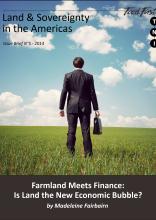History
Rooted in the early experiences and sensibilities of its founders—Frances “Frankie” Moore Lappé and Joseph Collins—Food First has been working to end the injustices that cause hunger since 1975. Since its first book, Food First: Beyond the Myth of Scarcity, Food First has gone on to publish over 60 books and hundreds of articles and research reports exposing the root causes of hunger and amplifying the voices of the communities and movements advancing real solutions. Over the years Food First staffers, fellows and interns have gone on to form new organizations including Pesticide Action Network, Neighbor to Neighbor, Global Exchange, Center for Living Democracy, Focus on the Global South, Korea Policy Institute, Land Research Action Network, Oakland Institute and the Oakland Food Policy Council. In 2010, Food First launched its Food Sovereignty Tours program to bring scholars, activists and farmers to the front lines of the global food movement. See below for a more detailed history.
Our Work
Food First is a “people’s think tank” dedicated to ending the injustices that cause hunger and helping communities to take back control of their food systems. We advance our mission through three interrelated work areas: research, education and action. These work areas are designed to promote informed citizen engagement with the institutions and policies that control our food and to integrate local, national and global efforts. Our work both informs and amplifies the voices of social movements fighting for food justice and food sovereignty.
Members:
Resources
Displaying 1 - 5 of 5Cultivating Gender Justice
This Backgrounder is the first in a multi-authored series on Cultivating Gender Justice. In this series, we seek to uncover the structural foundations of sexism in the food system and highlight the ways people, communities, organizations, and social movements are dismantling the attitudes, institutions, and structures that hold patriarchy in place. To end hunger and malnutrition, we must end injustices in the food and agriculture system.
Land the New Economic Bubble?
At the turn of the 21st century, farmland was still considered an investment backwater by most of the financial sector. Although some insurance companies have had farmland holdings for years, most financial investors found farmland, and agricultural investment in general, unappealing compared to the much higher returns to be made in financial markets.
Introduction: Farmland, A Safe Investment in Troubling Financial Times
This Land is Whose Land? Dispossession, Resistance and Reform in the United States
Food First Backgrounder, Spring 2014, Vol. 20, No. 1
Introduction: Land, Race and the Agrarian Crisis
The disastrous effects of widespread land grabbing and land concentration sweeping the globe do not affect all farmers equally. The degree of vulnerability to these threats is highest for smallholders, women and people of color—the ones who grow, harvest, process and prepare most of the world’s food.
The Great Soy Expansion: Brazilian land grabs in Eastern Bolivia
In the last two decades, the best agricultural lands in Bolivia have been put into commercial production by large-scale producers closely linked to foreign investors, particularly Brazilians. Foreigners now control more than one million hectares of prime agricultural and ranching lands in Bolivia, primarily in the eastern lowland department of Santa Cruz, an important agroexport region dominated by transnational corporations and what has been termed “trans-Latina” corporations or TLCs.
PROMISED LAND: Competing Visions of Agrarian Reform
Agrarian reform is back at the center of the national and rural development debate, a debate of vital importance to the future of the Global South and genuine economic democracy. The World Bank as well as a number of national governments and local land owning elites have weighed in with a series of controversial policy changes. In response, peasants landless, and indigenous peoples’ organizations around the world have intensified their struggle to redistribute land from the underutilized holdings of a wealthy few to the productive hands of the many.





